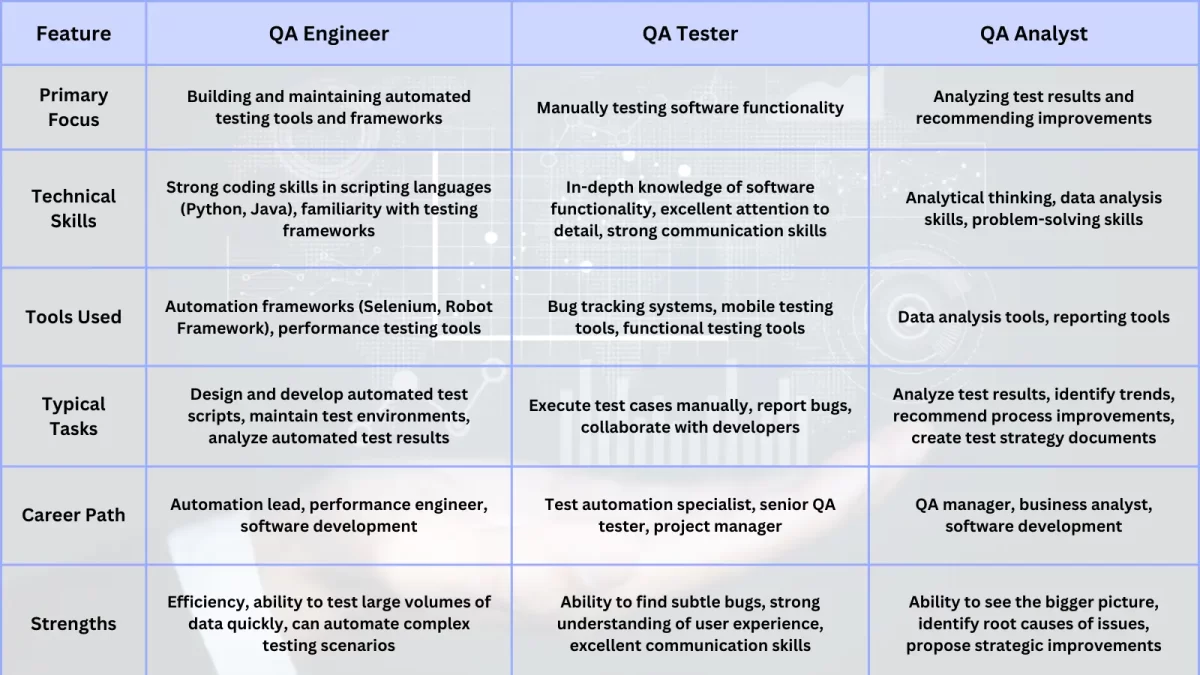Hey there! Software development is a complex field, and ensuring quality is a crucial part of it. But with so many job titles like “QA engineer,” “QA tester,” and “QA analyst” out there, it can get pretty confusing.
That’s why I’m here to help you out! In simple terms, quality assurance professionals are responsible for ensuring that software products are of high quality. However, each job title has a different set of responsibilities, which can be hard to understand. But don’t worry, I’m here to guide you through this exciting world of software quality assurance. Together, we’ll demystify these titles and help you understand the differences between them.
Table of Contents
QA Engineer: Building a Fortress of Quality
Imagine a software engineer constructing a magnificent castle. Now, picture a Quality Assurance Engineer meticulously inspecting its walls, testing its drawbridge, and ensuring it can withstand any attack. That’s what these folks do! They possess technical expertise, often with coding knowledge, to:
- Design and automate tests: They craft elaborate test cases and build tools to simulate user actions, ensuring the software functions flawlessly.
- Debug and fix bugs: Like knightly defenders, they identify and eliminate any glitches or errors that could hinder performance.
- Contribute to development: They work closely with software engineers, suggesting improvements and ensuring the final product is built with quality in mind.
QA Tester: The Tireless Explorer
Think of Quality Assurance Testers as brave adventurers venturing into uncharted software territory. They meticulously play with every feature, pushing buttons, exploring every corner, and reporting any abnormalities they encounter. Their tasks involve:
- Executing manual tests: While QA Engineers often automate, testers manually explore the software, trying out different scenarios and functionalities.
- Reporting bugs: They document any issues they find, like a knight returning with news of potential weaknesses.
- Providing feedback: They share their experiences with the development team, helping them understand how users might interact with the software.
QA Analyst: The Sherlock Holmes of Software
Picture a detective meticulously analyzing clues to solve a mystery. That’s the essence of a Quality Aassurance Analyst! They use their sharp minds to:
- Define testing strategies: They create a roadmap for ensuring all aspects of the software are thoroughly tested.
- Analyze test results: Like deciphering cryptic messages, they interpret test data, identifying trends and areas for improvement.
- Improve testing processes: They constantly evaluate and refine the testing methods used, ensuring they remain effective and efficient.
QA Engineers vs QA Testers vs QA Analysts
It’s not always black and white. Roles can overlap, and individuals might have skills across different areas. But remember:
- Quality Assurance Engineers: Build and execute tests, often with a coding background.
- Quality Assurance Testers: Manually explore and test software functionalities.
- Quality Assurance Analysts: Design testing strategies and analyze results.

The Synergy:
These roles work hand-in-hand. Engineers create the tools and processes, testers execute them, and analysts glean insights to improve the entire QA system. Each role is valuable, and their combined effort ensures comprehensive and effective software quality assurance.
Which Role is Right for You?
If you enjoy building and automating, a Quality Assurance engineer path might be ideal. If you have a keen eye for detail and love testing, becoming a Quality Assurance tester could be your calling. And if you thrive on analysis and problem-solving, a QA analyst role might suit you best.
Want to learn more?
- Check out online resources and courses on QA testing.
- Connect with QA professionals on social media or online forums.
- Consider internships or volunteer opportunities in QA to gain practical experience.
Ultimately, they all work together as a team, united in their mission: to ensure the software you use is bug-free, reliable, and delivers a top-notch experience!
Remember: This is just a glimpse into the exciting world of QA. Each role offers unique opportunities to contribute to the software development process. So, if you’re curious, analytical, and passionate about quality, dive deeper and discover which QA path might be your perfect quest!
